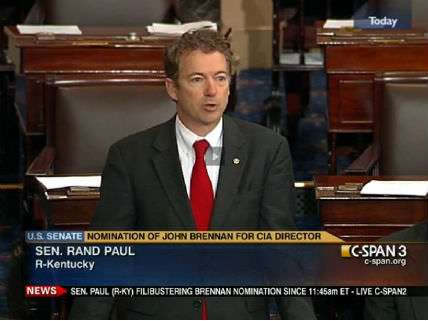Rand Paul Says He Will Vote Yes on SCOTUS Nominee Brett Kavanaugh
"After meeting Judge Kavanaugh and reviewing his record, I have decided to support his nomination."

Last week, Sen. Rand Paul (R-Ky.) said he was "very concerned" about Supreme Court nominee Brett Kavanaugh's "position on privacy and the Fourth Amendment." As Paul explained, "Kavanaugh's position is basically that national security trumps privacy…that worries me."
Today, Paul announced that he is no longer worried. "After meeting Judge Kavanaugh and reviewing his record, I have decided to support his nomination," Paul declared.
Paul's concerns centered on Judge Kavanaugh's 2015 statement concurring in the denial of rehearing en banc in Klayman v. Obama, which was then before the U.S. Court of Appeals for the District of Columbia Circuit. That case centered on the constitutionality of the National Security Agency's controversial information-gathering program, which involved the NSA collecting the telephony metadata of all Americans. "In my view," Kavanaugh wrote, "the Government's metadata collection program is entirely consistent with the Fourth Amendment."
Klayman put Kavanaugh at odds with Paul, who has repeatedly maintained that, "the bulk collection of all Americans' phone records all of the time is a direct violation of the Fourth Amendment."
So what caused Paul to stop worrying about Kavanaugh's Klayman opinion? "In reviewing his record," Paul announced today, "and through my conversation with him, I have hope that in light of the new precedent in Carpenter v. United States, Judge Kavanaugh will be more open to a Fourth Amendment that protects digital records and property."
In Carpenter v. United States, decided just last month, the Supreme Court ruled that a warrantless government search of a criminal suspect's historic cellphone location records violated the Fourth Amendment. This precedent does indeed cut against Kavanaugh's previous legal justifications for warrantless data collection.
Paul's announcement today suggests that in his private meeting with Kavanaugh, the SCOTUS nominee signaled his willingness to take a new view of the Fourth Amendment in light of Carpenter. If that is the case, Kavanaugh should say so publicly during his Senate confirmation hearings.


Show Comments (51)